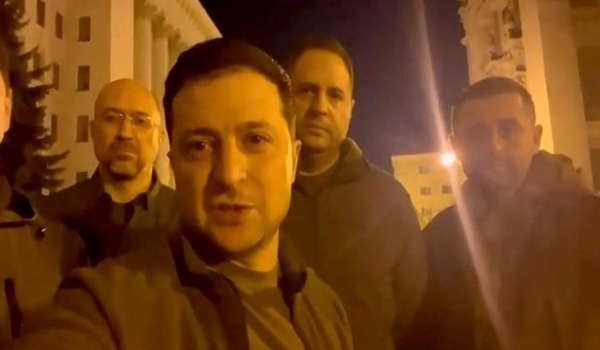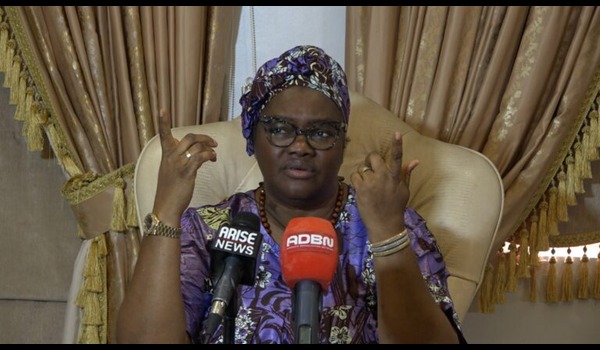Zelenskyy rejects US offer to leave Kyiv; additional sanctions on Russia including ban from Eurovision 2022
Ukraine’s president Volodymyr Zelenskyy has refused a U.S. offer to help him leave the city amid growing signs that Russia wanted to overthrow his government.
Earlier, the Ukrainian president hailed the efforts of those defending the country, paying tribute to the bravery of soldiers and civilians. At least 137 Ukrainians were reported died on Thursday.
Ukraine has called on all citizens who can bear arms to join in the defence of their homeland.
The centre of Kyiv remained in Ukrainian hands in the early hours of Saturday morning as intense fighting overnight appeared to stem the advance of Russia’s military towards the city.
Explosions and gunfire were heard throughout the night around the Ukrainian city, with reports of hundreds of casualties in the fighting.
The shelling sliced through at least one Kyiv apartment building and pummelled bridges and schools.
Meanwhile, the U.S. joined other Western allies in imposing sanctions directly on Russian President Vladimir Putin and his foreign minister, Sergei Lavrov who were excluded from the previous rounds of EU sanctions.
The measure means that EU-based banks will be prohibited from making funds available to them, although this will depend on the degree of cooperation from the financial entities.
The decision was confirmed by Josep Borrell, the EU’s foreign policy chief, on Friday evening.
“Russia needs to see that it is going to be isolated from the international community,” said Borrell.
“We’re going to get an agreement on that today. I think both of those names will be added to the long list of other names,” Simon Coveney, Ireland’s foreign affairs and defence minister, told reporters before heading to the ministerial meeting.
“I think that’s the right thing to do because they are the key decision-makers in terms of what’s happened over the last week or so.”
“Believe me, I’m not in the secret of Mr Putin’s and Mr Lavrov’s wealth. It’s not my duty. There are people who will take care of that,” said Borrell, when asked about how to trace the president’s assets to freeze them.
Borrell confirmed Russia’s expulsion from SWIFT, the international payment system, was not in the current package but was “possible to keep for future negotiations.”
The top diplomat added that a third sanctions package is on the pipeline, but avoided giving details.
“Nothing’s off the table,” he said. “We’re exploring all possibilities depending on the Russian behaviour.”
Putin is the third world leader to be personally sanctioned by the EU, following Belarusian President Alexander Lukashenko and Syrian President Bashar al-Assad, Borrell noted.
Earlier this week, the bloc sanctioned 351 Duma lawmakers and members of Putin’s inner circle.
Putin and Lavrov, however, will not be subject to a travel ban, a regular sanction that often accompanies the freezing of assets, in order to keep the diplomatic channels open.
“There must always be an opening for dialogue and diplomatic engagement, and if that involves travel, that needs to be facilitated,” he said.
The limitations of Western diplomacy have been exposed during the border crisis, now turned into a fully-fledged war, although French President Emmanuel Macron spoke with Putin as recently as Thursday evening.
The overwhelming speed in which the military attack is unfolding has drastically increased pressure on Western countries to come up with harsher and more radical punishments.
Thursday’s initial set of measures was then passed onto the bloc’s foreign affairs ministers to put the finishing touches. It was during these ministerial discussions that the option to freeze Putin’s and Lavrov’s financial assets came back to the table as a feasible option.
The final set of sanctions was unveiled on Friday evening after a meeting of EU foreign affairs ministers. The whole package will enter into force after its publication in the EU’s official journal.
Meanwhile, Russia has been banned from Eurovision 2022 as organisers say it would bring the contest ‘into disrepute’
“The Executive Board of the EBU made the decision following a recommendation earlier today by the Eurovision Song Contest’s governing body, the Reference Group, based on the rules of the event and the values of the EBU,” the organisation said in a statement on Friday evening.
“The decision reflects concern that, in light of the unprecedented crisis in Ukraine, the inclusion of a Russian entry in this year’s Contest would bring the competition into disrepute.”
We remain dedicated to protecting the values of a cultural competition that promotes international exchange and understanding, brings audiences together, celebrates diversity through music and unites Europe on one stage.
Organisers of the Eurovision Song Contest had been hit with a number of requests to ban Russia from competing in this year’s competition.
Scheduled to be held between 10-14 May in Turin, Italy, the contest is split into two semi-final heats before the grand final on Saturday 14th. Both Russia and Ukraine were listed as performing in the first Semi-Final on 10 May. Ukraine is currently scheduled to end the first half, and Russia was listed to end the second.




